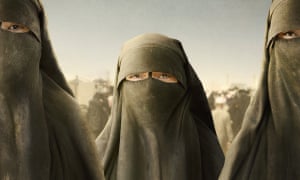‘It was like: people from Aberdeen shouldn’t rap!’ Scotland’s hidden hip-hop scene
At Hang, Scotland’s first hip-hop conference, the country’s MCs are given a hero’s welcome – but there’s also important discussion about the prejudices they face

“Here’s a golden oldie,” Nova laughs, breaking into her 2019 single 3am. The crowd scream like she’s just won Olympic gold. This is Hang – Scotland’s first hip-hop conference – and it’s the Edinburgh rapper’s first IRL show since she bagged the Scottish Album of the Year award in 2020 for her debut Re-Up. Topping off a day packed with DJ workshops, breakdance, spoken word and panels of industry experts, Nova’s triumphant headline set is a middle finger to anyone who still thinks there’s no hip-hop in Scotland.
Ransom FA, an Aberdonian rapper who’s competed on BBC’s The Rap Game and shared stages with heavyweights such as Skepta and Wiley, says: “One of the biggest hurdles I had was being a young Black kid with a Scottish accent trying to enter an English-based scene. It was like: people from Aberdeen shouldn’t rap!” He raises an eyebrow incredulously. Edinburgh MC Lotos shares a similar story: “When I first started out, people didn’t see it as viable to be a Scottish rapper. I’d come to London and they’d be like, ‘They’ve got Black people in Scotland?’ And they still do that! I find it remarkable. So I just started touring in the US.”
Created by the Scottish Alternative Music awards (Sama) in partnership with Creative Scotland, Hang (AKA Hip-hop Aimed Networking with Grime) is designed to give a career boost to artists working to overturn these roadblocks. For the charismatic, genre-hopping young rapper Chef, the night doubled as a release party – his new EP The World Is Mine dropped at midnight – and he’s coolly confident that Hang is one more sign that the Scottish scene is set to explode. “In five, 10 years we’ll be looking back on tonight,” he grins. “We’ll be saying: that’s when I met that artist, that’s where I made those connections. For us to be able to get together and share our knowledge, it’s really very important.”
According to Richy Muirhead, founder of Sama and co-founder of Hang, Scotland’s hip-hop scene has never been bigger – but until now, there haven’t been the resources to match its growth. “We need to create that infrastructure,” he says, “because there’s definitely an ambition and an appetite here.”
Euphoric live performances, from the sunnily smooth charisma of Ayrshire rapper Bemz to a show-stealing duet between Chef and stunning R&B vocalist AiiTee, follow a day dedicated to the scene’s biggest questions. One panel dissects the myth that artists need to move to London to make it big, while others break down how to secure radio play and media attention, alongside broader discussions of hip-hop’s roles in Scottish society.
A brand-new Creative Scotland bursary has been launched with an initial pot of £15,000 set to be distributed among emerging hip-hop-adjacent artists. It’s an important step towards improving access to arts funding, but as panellist Khaleda Noon points out, it’s just the beginning: “Black people and people of colour continue to be excluded when it comes to funding decisions.” Noon is the founder of Intercultural Youth Scotland, which runs a scheme called Block Beats, providing free access to music studios for young people of colour, facilitated by anti-racist practitioners. The impact so far, she says, has been “astounding”: young Block Beats artists who otherwise “did not have the networks or money to pay for studio time” have already gone on to partner with prestigious institutions such as the Scottish Ballet and the National Galleries of Scotland.
Despite those persistent assumptions that Scotland isn’t home to hip-hop – even though Young Fathers won the Mercury prize in 2014 – its music and culture has been central to the Scottish cultural underground ever since it first crossed the Atlantic. Hip-hop’s energy, artistry, community spirit and political expression made a major impact on young Scots in the 80s, inspiring them to speak up about social injustice. Homegrown hip-hop records followed in the early 90s, when Scottish rappers began to embrace their own accents while remaining inspired by the sounds and attitudes that began in the Bronx. Many of those early, key players – such as Steg G, Shelltoe Mel and Southside Deluxe label boss Mistah Bohze – are at Hang, sharing their experiences with a new generation of passionate artists.
“At first I thought I was the only rapper in Scotland,” says MC and author Loki, AKA Darren McGarvey – who won the Orwell Prize in 2018 for his book Poverty Safari – while speaking on a panel about Scottish hip-hop history. “[Then] I learned I was part of an illustrious community, a complex weft of different phases and styles.”
Where London-centric English rap is increasingly collaborative around the country, the Scottish scene has always been this way. Chef’s new EP is a tour through Scotland’s cities, recorded with rising stars in Aberdeen, Dundee, Glasgow and Edinburgh. “There’s a massive difference between Scottish and English rap,” he says, “and I think those differences should be celebrated. The English have their own sound already, and I’m obviously inspired by London grime, but Scottish artists are striving to make international sounds.” His goal? “We’re going to be worldwide. I know it.”



